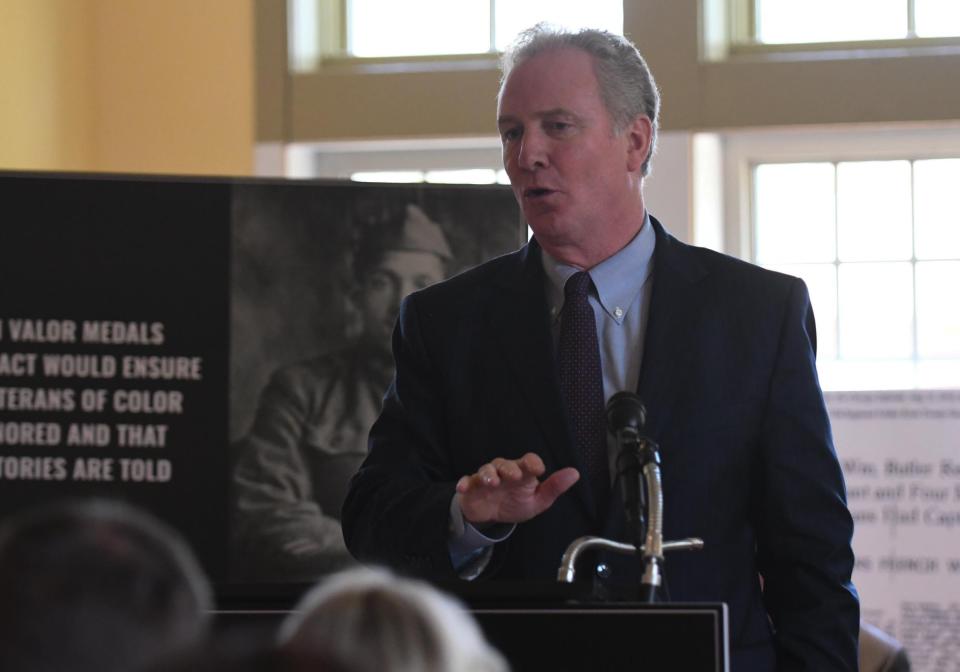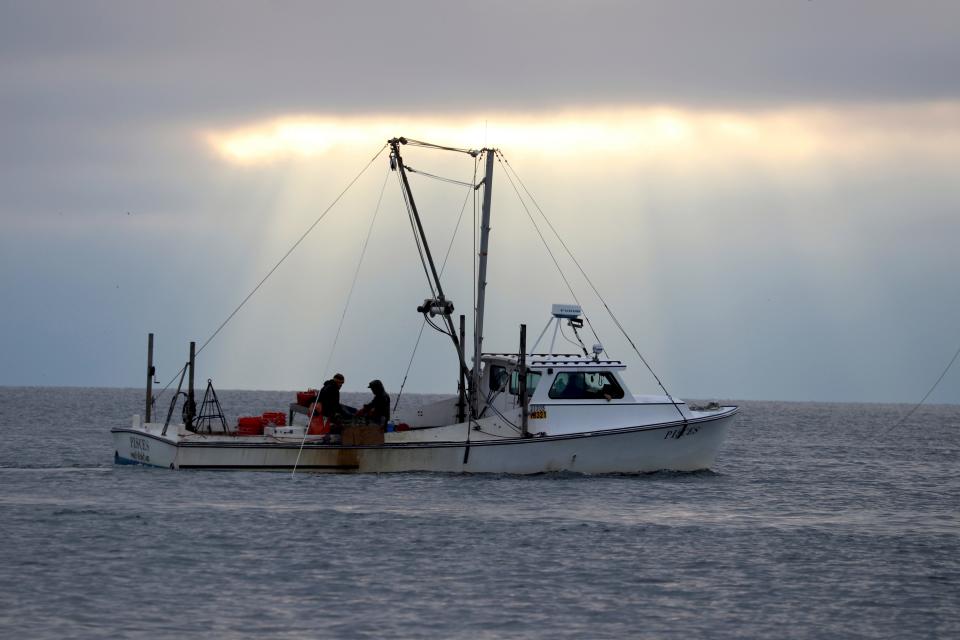Infrastructure bill signed into law includes nearly $8 billion for Maryland projects
- Oops!Something went wrong.Please try again later.
- Oops!Something went wrong.Please try again later.
The infrastructure bill that won final passage by the House and has now been siged into law by President Joe Biden, includes nearly $8 billion for highway, public transportation, ports and broadband projects throughout Maryland.
The $1.2 trillion measure cleared the House on a bipartisan 228-206 vote. The bill passed the Senate on a bipartisan vote in August.
The massive spending legislation provides nationwide funding for infrastructure projects such as bridges, highway and airport construction, water pollution control, groundwater storage, broadband and public transportation, including improvements to Amtrak.
The infrastructure bill is the first half of President Joe Biden’s legislative agenda. The second part, the so-called “Build Back Better” bill, would provide nearly $2 trillion in investments in new social programs, but its final scope remains the subject of intense negotiations among moderate and progressive Democrats in the House and Senate.

The infrastructure bill provides funding for state priorities, including another round of support to build out high-speed internet and broadband access. The legislation also is expected to generate “huge numbers” in job creation for Maryland, Sen. Chris Van Hollen, D-Maryland, told Capital News Service..
“The job estimates that I’ve seen are in the hundreds of thousands,” he added.
According to a a variety of sources, including the White House and House Majority Leader Steny Hoyer, funds for Maryland are expected to include:
$4.1 billion for federal-aid highway projects over five years
$1.7 billion for revitalizing almost a quarter of aging public transportation vehicles, and over $150 million to the Washington Metro Transit Authority to improve safety and make repairs over eight years.
$844 million for improving water infrastructure and ensuring clean drinking water in communities
$238 million to continue the restoration of Chesapeake Bay over five years
$409 million for bridge replacement and repairs over five years
$200 million for expanding broadband coverage, including providing internet access to at least 148,000 Marylanders who currently do not have such service
$158 million for airport infrastructure improvements development over five years.
$63 million for supporting the expansion of an electric vehicle charging network over five years
$15.9 million for protecting Marylanders against cyberattacks
$7.9 million for protecting against wildfires over five years, and for preparing infrastructure for the impact of extreme weather events
Maryland will also benefit from the bill’s $3.5 billion national investment in housing weatherization programs, which would cut energy costs for low-income households.

Improvements to Maryland’s infrastructure have been long overdue, supporters have said. In 2020, the American Society of Civil Engineers gave the state a C grade, based on a 12-category Infrastructure Report Card, a slight bump from the C- Maryland received in 2011.
All Maryland House Democrats voted in support of the bill, but Rep. Andy Harris, R-1st, the sole Republican in the delegation, opposed the measure.
“Yesterday's infrastructure bill added hundreds of billions of dollars to the federal debt,” Harris tweeted. “We have to stop spending our children and grandchildren's money.”
Maryland Democratic Sens. Ben Cardin and Van Hollen supported the legislation.
The infrastructure bill also includes an amendment to make an agency supporting the growth of minority business enterprises permanent, which was in part sponsored by Cardin, the chairman of the Senate Small Business and Entrepreneurship Committee.
Maryland’s nearly $8 billion share of the infrastructure bill is just the start, Van Hollen said.
“That’s also a minimum … that’s what Maryland would get when you sort of apply the federal formulas,” he said. “But on top of the formulas, Maryland will be eligible to compete for lots more.”
More: $27.7 million boost to benefit Wicomico infrastructure, Shore Transit
More: 'Water just kept coming': How flooding in Salisbury moves from headache to an emergency
The Bridge Investment Act, a competitive grant program within the bill, allows states to apply for $12.5 billion in financial assistance over five years to improve the safety, reliability and condition of their bridges, as well as nearly $16 billion in national funding for major projects.
“This transformative legislation will modernize America’s infrastructure, expand broadband access, create jobs for Marylanders, accelerate the adoption of electric vehicles to address the climate crisis, support manufacturing jobs and bolster transportation safety programs,” Rep. Kweisi Mfume, D-Baltimore, said in a statement.
Ahead of the infrastructure bill’s passage, House progressives were negotiating over commitments to include certain programs in the Build Back Better Act. House Speaker Nancy Pelosi, D-California, told reporters in Glasgow, Scotland, that she has set a vote on the latter bill for this week.
Hoyer onsaid in a statement: “I am confident that the House will advance this transformational legislation soon and make fully paid-for, generational investments in children, families, communities, and addressing the climate crisis.”
Biden’s Build Back Better Act framework, among other things, expands Medicare coverage for hearing benefits, promotes clean energy technology and provides free, universal preschool for 3- and 4-year-olds.
“For seven years, Maryland has been leading on rebuilding crumbling infrastructure and advancing vital investments for the future like cyber security, broadband, and resiliency,” Maryland Gov. Larry Hogan, a Republican, said in a statement.
This article originally appeared on Salisbury Daily Times: Infrastructure law includes nearly $8 billion for Maryland projects
